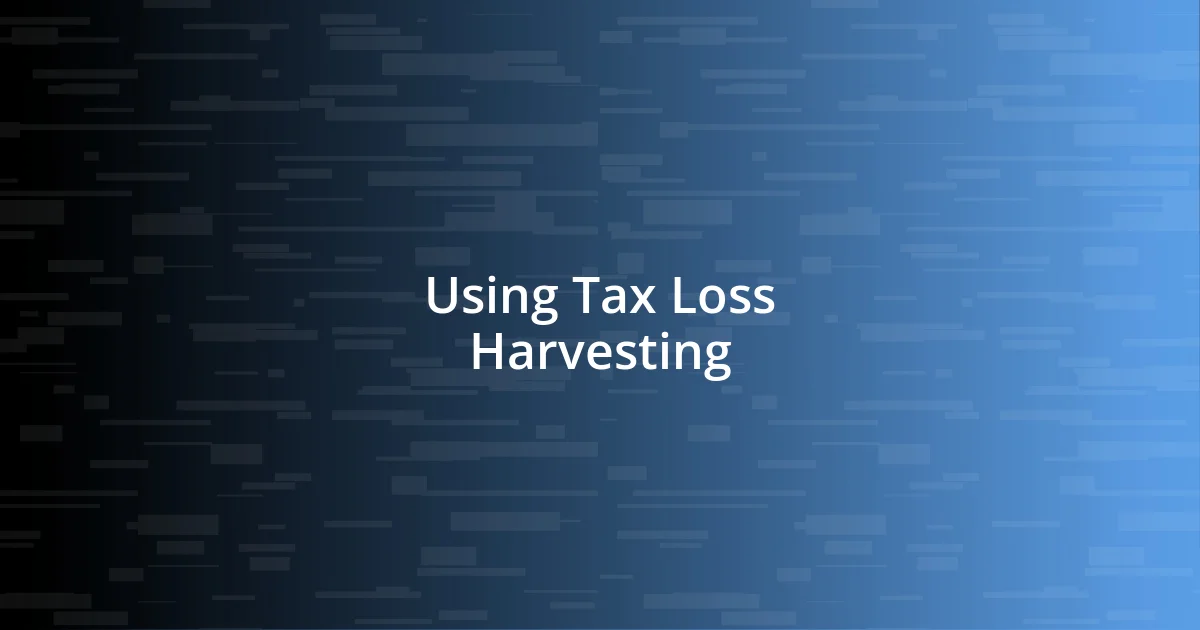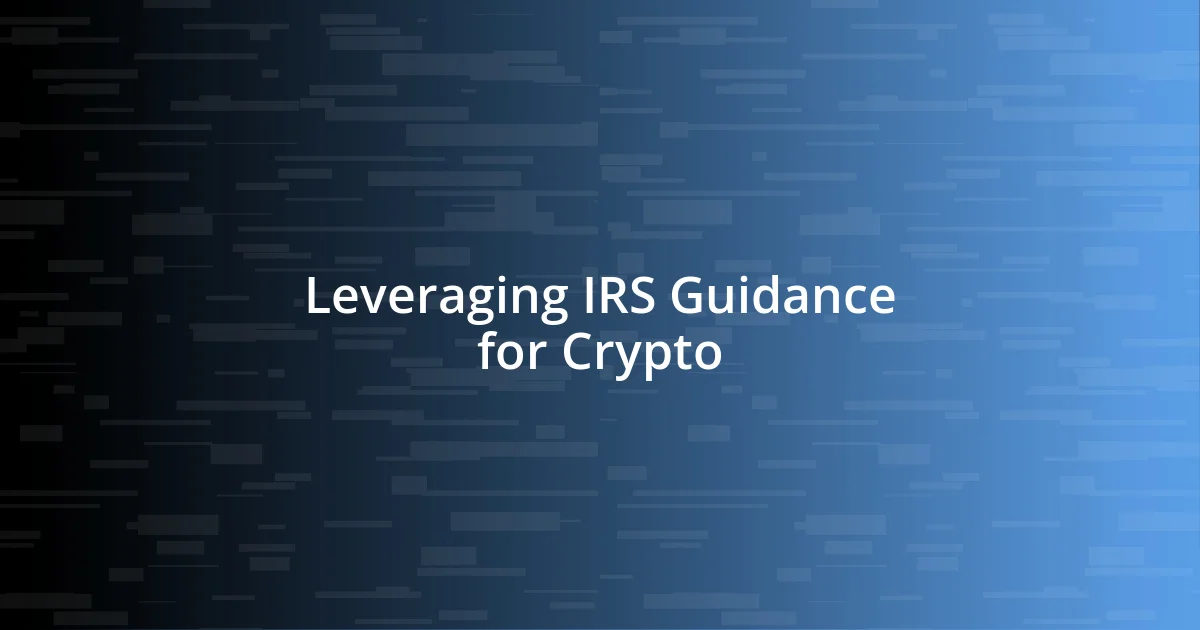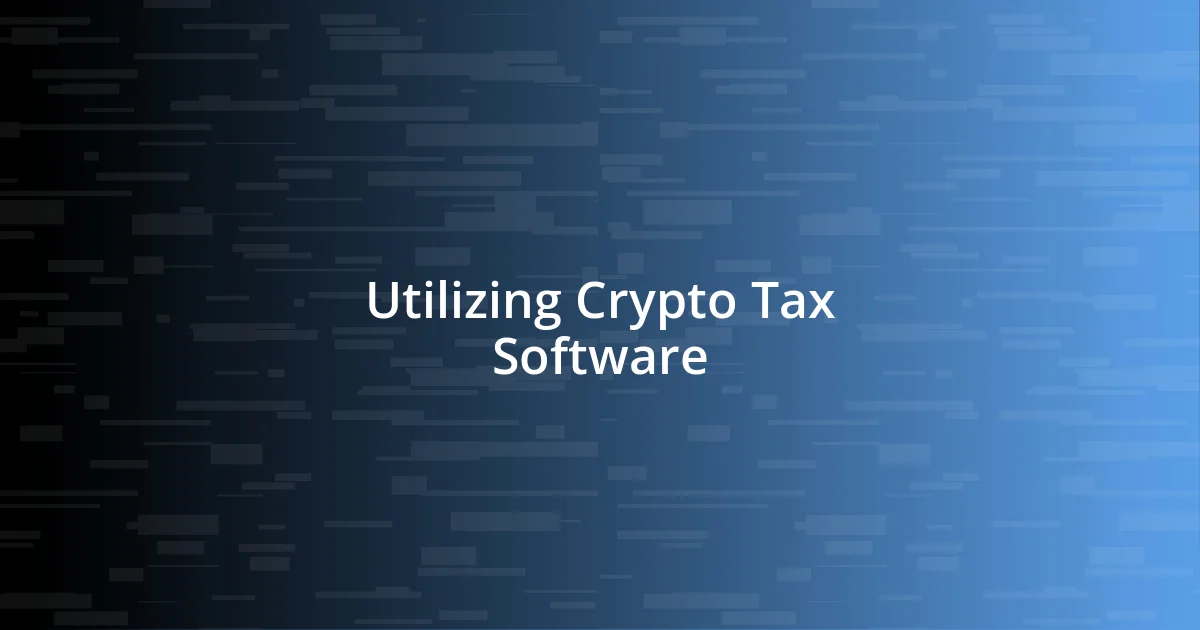Key takeaways:
- Cryptocurrency is considered property by the IRS, making trades and exchanges taxable events; proper record-keeping is essential.
- Utilizing tax loss harvesting allows investors to offset gains with losses, potentially reducing overall tax liability.
- Engaging with crypto tax software and consulting with tax professionals can streamline reporting and ensure compliance while identifying strategies to optimize tax situations.

Understanding Crypto Tax Basics
Taxation on cryptocurrency can be quite the puzzle, and I can’t help but chuckle when I think back to the first time I tried untangling it. The IRS considers cryptocurrencies as property, meaning that every trade, sale, or exchange can trigger a taxable event. I remember feeling overwhelmed by the idea that my little cryptocurrency investments would be subjected to the same rules as real estate!
Have you ever felt that anxious pit in your stomach when dealing with tax documents? It’s a familiar feeling for many crypto investors. When I realized that I’d need to track everything from purchases to trades and even losses for my taxes, it hit me just how important proper record-keeping is. A solid strategy can mean the difference between facing unexpected tax liabilities or making the most of potential deductions.
One crucial aspect to keep in mind is the difference between short-term and long-term capital gains. If you hold crypto for more than a year before selling, you could benefit from lower tax rates. I’ve often found myself wondering: is it worth holding onto that coin a little longer just for the sake of tax savings? Each decision can feel like a strategic move in a high-stakes game, and having clear knowledge of these basics really empowers us as investors.

Recognizing Taxable Crypto Events
When it comes to recognizing taxable crypto events, trading or selling cryptocurrencies is the most obvious trigger. I once had a friend who unknowingly triggered a tax event by trading Bitcoin for Ethereum. She thought she was just making a smart investment switch, but I reminded her that the IRS sees this as a sell and buy scenario, which can lead to unexpected tax consequences. It’s essential to stay alert with each transaction.
Another taxable event that often flies under the radar is receiving cryptocurrency as payment. I vividly remember when I accepted Bitcoin for my freelance work. The moment I received it, I realized that I now had to record the fair market value at the time of receipt for tax purposes. It was an eye-opener, emphasizing the importance of understanding how each transaction can affect my tax situation.
Lastly, crypto staking and earning interest can also generate taxable events. I remember feeling thrilled when I started earning rewards from staking my coins. However, the excitement waned when I figured out that those rewards are taxable as income, reported at the fair market value on the day I received them. It’s crucial to keep detailed records for accurate tax reporting—otherwise, you might find yourself tangled up come filing season.
| Taxable Event | Description |
|---|---|
| Trading/Selling | Exchanging or selling your cryptocurrency for another or cash; triggers capital gains tax. |
| Receiving Payment | Getting paid in cryptocurrency; report fair market value as income. |
| Staking Rewards | Rewards earned from staking; taxable as ordinary income when received. |

Using Tax Loss Harvesting
Using tax loss harvesting can feel like a strategic maneuver I often wish I had known about earlier in my investment journey. The idea is relatively straightforward: if I have investments that have lost value, I can sell them to offset gains made elsewhere, thereby reducing my overall tax burden. I recall a time when I felt disheartened watching the value of one of my altcoins plummet; it hit me that rather than just sulking over the loss, I could leverage it to my advantage come tax time. The relief of realizing I had a plan instead of merely focusing on losses was a game changer.
- Tax loss harvesting helps lower taxable capital gains by offsetting losses against gains.
- I can sell an underperforming asset and reinvest in another similar asset (with caveats around the “wash sale” rule).
- This strategy is especially useful in volatile markets where values fluctuate dramatically.
- It’s essential to keep meticulous records of transactions to substantiate any claims when filing tax returns.
- Engaging with a tax professional can help tailor a tax loss harvesting approach that aligns with my financial goals.
Utilizing this strategy has transformed my view on losses; instead of seeing them as defeat, I now view them as potential opportunities to improve my tax situation. As I continue to navigate the unpredictable waters of cryptocurrency investment, I am continually reminded of how strategic actions can empower my overall financial health.

Leveraging IRS Guidance for Crypto
When it comes to navigating the labyrinth of crypto taxation, leveraging IRS guidance can really be a game changer. I still remember the relief I felt after reading the IRS Notice 2014-21, which clarified how transactions like trading and receiving crypto are viewed for tax purposes. It made me realize that being informed about IRS guidelines was not just a checkbox to tick off; it genuinely shaped the way I approached my investments. Are you aware of the specific guidelines that can help streamline your reporting?
One key takeaway from the IRS guidance is how it emphasizes the need for proper record-keeping. I learned the hard way that maintaining detailed records of transactions, including dates and fair market values, can save a lot of headaches during tax season. Just last year, I was sifting through countless emails and exchanges trying to recall the value of my Bitcoin trades. It was a messy process that could have been smoother if I had kept meticulous notes from the start. Don’t you think keeping organized records is worth the effort?
Additionally, taking advantage of IRS advisories on different types of crypto transactions has opened new possibilities for tax strategies in my own portfolio. For instance, when I decided to engage in DeFi (Decentralized Finance) activities, I revisited those IRS recommendations to clarify how staking and yield farming would impact my taxable income. Diving deep into IRS resources allowed me to turn what seemed like a chaotic environment into a manageable roadmap. Have you explored all the IRS resources available to help demystify your crypto transactions?

Tracking Crypto Transactions Efficiently
Tracking my crypto transactions efficiently has been nothing short of a journey. When I first dipped my toes into cryptocurrency, I was overwhelmed by the idea of keeping tabs on every single exchange. But I quickly learned that using dedicated software tools designed for tracking crypto trades dramatically simplified my process. These platforms not only help me monitor my investments in real time but also automatically calculate gains and losses, which takes a significant weight off my shoulders during tax season. Have you ever wondered how much time and stress a good tracking tool could save you?
In particular, I found that integrating my wallet data directly into tracking software was a game changer. Initially, I was manually logging transactions, which became an arduous and error-prone task, especially as my portfolio grew. Realizing I could sync my wallets to automatically pull transaction details helped me manage everything more accurately. It’s practically a breath of fresh air to see all my data streamlined in one place. How much easier could your life be if you didn’t have to dig through your transaction history?
Additionally, I discovered the importance of maintaining a transaction log that includes not just my trades, but also fees, dates, and the purpose of each transaction. One day, I was shocked to find an inconsistency in my records during a casual review. It turned out that not documenting a small transfer had thrown my calculations off entirely. This experience served as a crucial reminder that every detail matters. Do you keep a thorough record of not just your trades, but the context behind each one? Knowing I’m on top of all my transactions has not only alleviated anxiety but also empowered me to make more informed investment decisions.

Utilizing Crypto Tax Software
Utilizing crypto tax software has truly redefined how I approach my annual tax preparation. Initially, I considered doing everything manually, thinking it was a good way to save some money. However, after struggling with spreadsheets filled with numbers and complex calculations, I quickly realized specialized software could not only ease my burden but also minimize the risk of errors. Have you ever felt the immense pressure of needing to ensure your numbers are absolutely correct?
One feature I’ve found invaluable is the ability to generate customized tax reports directly from the software. I remember the first time I pressed ‘generate report’ and just sat there, amazed at how it compiled all my transactions into a neat package. Gone were the days of scouring through countless transaction histories and receipts; instead, the software provided me with a clear summary that matched my records perfectly. It’s moments like these that make you wonder—why didn’t I do this sooner?
Moreover, the real-time profit and loss tracking offered by crypto tax software has been a revelation. I can’t tell you how beneficial it feels to instantly see how my trades affect my overall tax liability. There was a period when I made several trades daily, which felt like an exhilarating adventure but was a nightmare for tracking my gains and losses. Finding out my software could give me a running tally changed the game for me. Have you ever wished you could make financial decisions with immediate insights at your fingertips? It’s a powerful tool that empowers you to strategize in a more informed and confident manner.

Planning for Future Crypto Taxes
Planning for future crypto taxes is something I’ve come to realize requires proactive thinking. I remember one year, I was completely caught off guard by my tax bill because I hadn’t considered the impact of some late-year trades. Moving forward, I started setting aside a percentage of my profits throughout the year specifically for tax obligations. It turned out to be an incredibly stress-relieving strategy. Have you thought about how setting money aside could give you peace of mind come tax season?
I’ve also learned the value of considering the long-term implications of my trading decisions. For example, when I decided to hold onto some assets rather than sell for a quick profit, I realized it wasn’t just about avoiding short-term capital gains tax; it was about planning for a more favorable tax situation in the future. This shift in mindset has really allowed me to play the long game, reducing my immediate tax burden while setting myself up for a more advantageous situation later on. Could looking further down the road change your approach to taxes?
Finally, regularly consulting with a tax advisor has become a cornerstone of my planning strategy. I remember sitting down with mine and discussing the nuances of crypto taxation—it was eye-opening. They pointed out deductions and strategies I had never considered. I now view these sessions as essential check-ins to fine-tune my approach as tax laws evolve. Have you thought about how professional guidance could transform your understanding of crypto taxes? Getting that expert insight makes all the difference in not just surviving tax season, but thriving within it.














